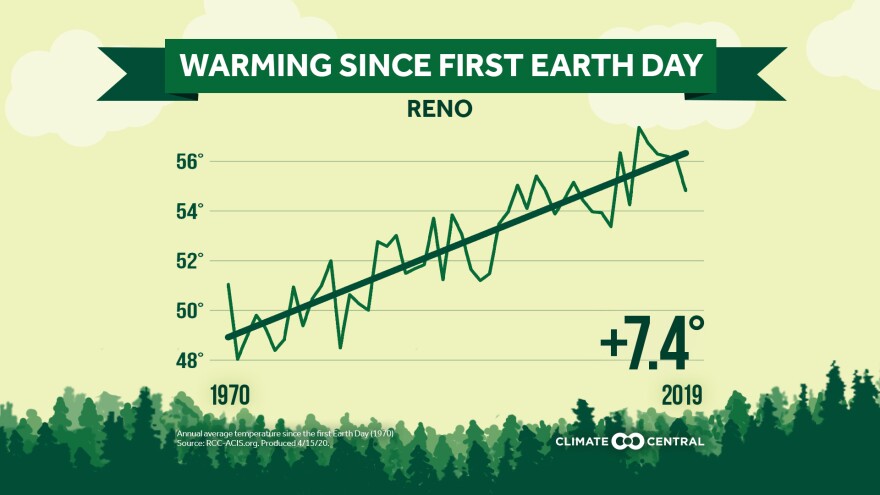April 22 marks the 50th anniversary of the first Earth Day back in 1970. Much has changed since then, from climate science to renewable energy. Dr. Kristen Averyt is Nevada's State Climate Policy Coordinator, and she spoke with KUNR to talk about how things have evolved over 50 years.
GLICK: What does a state climate policy coordinator do exactly and what have you been tasked with?
AVERYT: You know one of the most important things that I'm going to be doing is working with teams across the different state agencies to really coordinate the ramp-up for our climate strategy. The climate strategy was actually defined in the executive order issued by Governor Sisolak last November and needs to be delivered on December 1. We're really looking to use that as a springboard to launch our efforts across the state, really focused on addressing the issues around climate change. That is task number one on my list, the climate strategy.
GLICK: You started the job in early March. So, how has it been going so far given the current pandemic we're in, and how is it different than what you expected?
AVERYT: Well I think given that it is an entirely new position and we are framing it in some ways as we move along, of course, we're going to have challenges, and this is just another hurdle that we need to overcome. In a lot of ways the current situation, the pandemic, it's really highlighted the importance of science-informed policymaking and science-informed decisions. I think now more than ever it gives us the opportunity to really point to what the scientists have been saying about climate change, and really the gravity of the importance that we act.
GLICK: Let's talk climate change. There have been several reports out there looking at how climate change impacts public health, and that was before COVID-19 came along. I'm curious what kind of effect does climate change has on public health broadly and how [has] that changed based on what we know about COVID-19?
AVERYT: I think for our communities one of the things that we really need to pay attention to is urban heat, and how hot it gets in our cities. By several different measures, Reno and Las Vegas are among the fastest forming cities in the United States and granted only a fraction of that warming, somewhere around a third, can be attributed to climate change.
Nonetheless, it really exposes our populations in those places to a lot of different challenges. Number one, just flat out, heat. For the hottest days down here in Las Vegas, for example, we get about five days a year above 115 degrees. By the turn of the century, we're looking at maybe 50 days above 115 degrees. You can imagine what that could do to an individual who perhaps has to work outside.
Another concern is air quality. Climate change exacerbates air quality and we know we have issues both in Reno and in Las Vegas with our air quality that we have been addressing but we need to do better.
GLICK: So Earth Day is 50 years old today. How has the climate and climate policy changed since that first Earth Day back in 1970?
AVERYT: Well I would say 50 years ago we were still debating on climate change and it was still kind of a question that was out there in the scientific community. But today it is absolutely crystal clear to the experts that we need to act on climate and that our planet is getting hotter and we need to act immediately. The science has come a long way and I think there's a particular reason that the global theme this year is climate action on the 50th anniversary of Earth Day.
GLICK: What action or actions would you say would make the biggest difference in terms of fighting climate change?
AVERYT: You know there is a lot we need to contemplate in terms of the trade-offs and really what investments we want to make and what are going to be the trade-offs in terms of reducing our greenhouse gas emissions. I think this is a lot of what we need to contemplate as we're moving through this climate strategy process, and not just before December 1, but really have ongoing discussions about what are going to be the best policy options for us to pursue.
We do know that the transportation sector is the number one emitter of greenhouse gasses in this state, and we have adopted ambitious reduction targets which meet zero by 2050. So we really need to be doing everything and anything that we can, but there are going to be certain sectors that we look pretty closely at.






